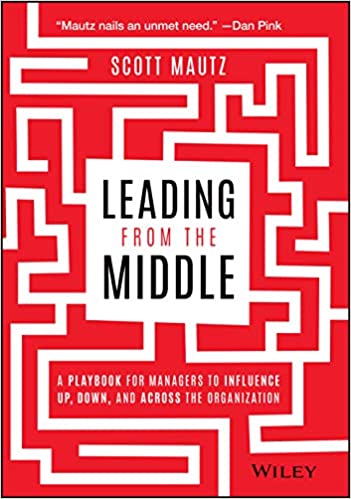Podcast (lead-with-a-story-podcast-series): Play in new window | Download | Embed
Subscribe: RSS

Middle management gets a bad rap. It brings to mind terrible bosses from the Dilbert cartoons or Michael Scott from The Office, or a career graveyard for mediocre leaders unable to reach the upper echelons of management.
And that’s too bad. Because the truth is, most of us are in middle management and always will be. So, rather than languishing in it — which only bolsters the lousy reputation — lean into it. With the right tools, you can be wildly successful as a middle manager. And this week, I spoke this week with someone who literally wrote the book on those tools.

Scott Mautz spent 20 very successful years in middle management at The Procter & Gamble Company. Today he writes for Inc. Magazine, is a keynote speaker and leadership coach, and the author of the new book, Leading from the Middle: A Playbook for Managers to Influence Up, Down, and Across the Organization.
In our conversation, Scott shared a few of the tools he recommends to middle managers. Click play above to listen. Here’s an overview of our conversation with a small sample of tips from the book:
3 Tools for Managing UP: How to Disagree with Your Boss
1) Always discuss INTENT before CONTENT – When you need to tell the boss they’re wrong, diving right into your disagreement can be off-putting and lower the likelihood they’ll listen and agree.
Instead, preface the content of your disagreement with your intent in sharing it. That way they know the disagreement is coming from a place of respect and desire for mutual success, as opposed to a result of animosity or desire to see the boss fail. Something like this,
“You know, you told me when I first got here that I should be candid with you. I think you’ve been a great boss, and I respect what you’ve accomplished here. But on this issue, I’m in a different place. And so, my intent here is to give you some other alternatives that I think will help us be more successful…”

2) Be respectfully candid – And both words are important. If you’re not candid, you won’t make a difference. And if you’re not respectful, you’ll offend and won’t earn the right to be candid.
3) Avoid judgment words – These conversations go south when the language starts to seem accusational. It sounds like this, “…and the reason why I think you made that decision is because you’re too power hungry (or not empathetic enough, or don’t care about your employees, etc.)”
Stick to the decision and the ramifications. Let them do their own self-analysis unless they ask you for your opinion about that.
3 Tools for Managing DOWN: How to give feedback so that people view it as a gift
4) Be specific – Bland, generic feedback won’t help. Telling someone they’re too analytical isn’t actionable.
Give specific examples of what they did well and did poorly. “You probably spent too much time and effort analyzing the ABC project and as a result, most of what you did never even got shared with management because it wasn’t very helpful.”
5) Be calibrated – Meaning, the feedback needs to indicate how big a deal the mis-step was and what ramifications it might have, if any, on their future career.
If you just tell them they didn’t meet your expectations in the last meeting, and leave it at that, they might spend weeks spiraling into unproductive worry.
Instead, give them some indication of the severity. Either, “…but that’s okay. That’s about where I would expect you to be this early in your assignment”, or “…so, we’ll need to work on this quickly so that it doesn’t hold you back.”
6) Be proportionate – Human beings want five pieces of positive feedback for every piece of negative feedback. Many of them want what Scott calls a “compliment sandwich” — tell me something good about me, them give me the negatives, then close with something else good.
4 Tools for Managing ACROSS the organization
This is for when you’re trying to influence your peers or other people you have no direct authority over. And if you think about the people in your work life who’ve influenced you the most, even though they had no direct authority over you, Scott’s research suggests those people did one (or more) of the following four things:
7) Cared about you, and showed it somehow
8) Listened to you when you needed it
9) Gave you something, or
10) Taught you something
Investing in people in these ways tends to earn you their ear and their respect, which means they’ll be more open to following your leadership even though they don’t have to.
You can learn more about Scott at scottmautz.com. And if you go to scottmautz.com/freetools, you’ll find some free tools to help you lead from the middle.
Click these links to subscribe to this podcast on iTunes or Stitcher, or Podbean.

Paul Smith is one of the world’s leading experts on business storytelling, a keynote speaker, and bestselling author.
Connect with him via email here. Follow him on Facebook and LinkedIn.


